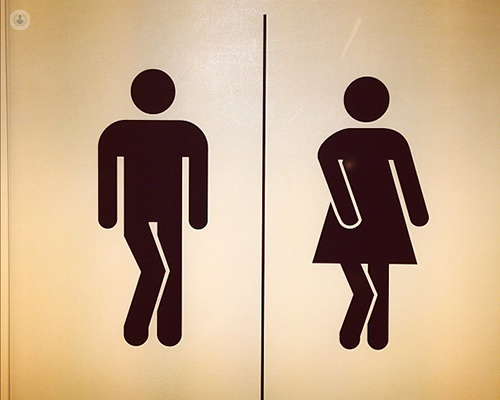Bursting to go: How do you deal with an overactive bladder?
Written by:Overactive bladder (OAB) is a very common condition, affecting an estimated 12 per cent of the population over the age of 40, and one of the most common causes of urinary incontinence (UI). Here, expert consultant urologist Mr Ranjan Thilagarajah explains all about the condition.

What is overactive bladder?
Overactive bladder is described as a frequent urgency to pee, with or without urinary incontinence and with a need to pee a lot at night (nocturia).
The condition can have a serious impact on the quality of life of the sufferer, and has negative effects on social life of the patient.
If you suffer the following symptoms, it may be a case of overactive bladder:
- A frequent urgency to go to the toilet
- Frequent visits to the toilet (more than 8 per 24 hours)
- Nocturia – peeing two or more times after going to sleep, and returning to sleep after each time
- An absence of obvious urinary tract disease or infection
You may experience one or all of the symptoms, and each symptoms can have detrimental effects on all aspects of a person’s life.
Overactive bladder can also cause other negative effects, such as causing a lack of continuous sleep, an increased risk of falls in the elderly as they need to go to the toilet more often, and has a negative social stigma.
How does an overactive bladder cause urinary incontinence (UI)?
Overactive bladder is one of the most common causes of urinary incontinence, which is defined as ‘the complaint of any involuntary leakage of urine’. The constant need to go to the toilet can increase the chance of being ‘caught short’ before making it to the toilet. There can be an increased risk of incontinence while sleeping.
What causes an overactive bladder?
There are a number of factors which cause an overactive bladder. With normal bladder function, when the bladder is full, the relaxation of the pelvic floor is coordinated with the relaxation of the muscles of the urethra and the tightening of the muscles of the bladder to push the urine out.
With an overactive bladder, the bladder muscles contract involuntarily, even when the bladder is not full. This could be caused by a number of conditions such as stroke, multiple sclerosis and diabetes, and factors such as excessive consumption of caffeine or alcohol, medications that cause an increase in urine production, and incomplete bladder emptying.
How to manage an overactive bladder
There is no known cure for an overactive bladder, but there are some ways to manage or prevent the condition:
- Control how much you drink
- Get regular exercise
- Limit the amount of caffeine and alcohol you consume
- Quit smoking
- Eat healthily
There are also some medications which can help with some of the effects of an overactive bladder. If you are concerned about an overactive bladder, or would like to know more about your options, make an appointment with a consultant urologist.


